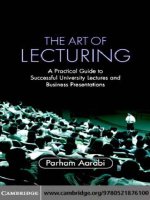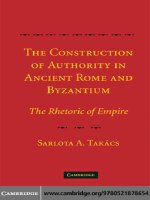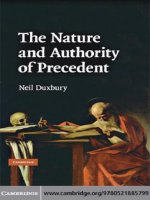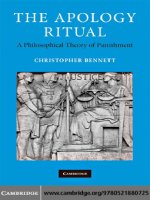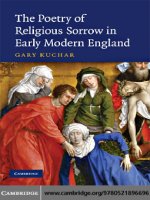0521803519 cambridge university press the anti jacobin novel british conservatism and the french revolution oct 2001
Bạn đang xem bản rút gọn của tài liệu. Xem và tải ngay bản đầy đủ của tài liệu tại đây (1.15 MB, 287 trang )
This page intentionally left blank
THE ANTI-JACOBIN NOVEL
The French Revolution sparked an ideological debate which also
brought Britain to the brink of revolution in the s. Just as radicals wrote ‘Jacobin’ fiction, so the fear of rebellion prompted conservatives to respond with novels of their own, indeed, these soon
outnumbered the Jacobin novels. This is the first survey of the full
range of conservative novels produced in Britain during the s
and early s. M. O. Grenby examines the strategies used by
conservatives in their fiction, thus shedding new light on how the
anti-Jacobin campaign was understood and organised in Britain.
Chapters cover the representation of revolution and rebellion, the
attack on the ‘new philosophy’ of radicals such as Godwin and
Wollstonecraft and the way in which hierarchy is defended in these
novels. Grenby’s book offers an insight into the society which produced and consumed anti-Jacobin novels, and presents a case for
re-examining these neglected texts.
M. O. GRENBY
is Hockliffe Research Fellow in the English Department at De Montfort University. He recently held the FulbrightRobertson Professorship of British History at Westminster College,
Fulton, Missouri. He has written for a number of scholarly journals, and has been a regular contributor to History: the Journal of the
Historical Association. This is his first book.
CAMBRIDGE STUDIES IN ROMANTICISM
General editors
Professor Marilyn Butler
Professor James Chandler
University of Oxford
University of Chicago
Editorial board
John Barrell, University of York
Paul Hamilton, University of London
Mary Jacobus, Cornell University
Kenneth Johnston, Indiana University
Alan Liu, University of California, Santa Barbara
Jerome McGann, University of Virginia
David Simpson, University of California, Davis
This series aims to foster the best new work in one of the most challenging
fields within English literary studies. From the early s to the early s
a formidable array of talented men and women took to literary composition,
not just in poetry, which some of them famously transformed, but in many
modes of writing. The expansion of publishing created new opportunities for
writers, and the political stakes of what they wrote were raised again by what
Wordsworth called those ‘great national events’ that were ‘almost daily taking
place’: the French Revolution, the Napoleonic and American wars, urbanisation, industrialisation, religious revival, an expanded empire abroad and the
reform movement at home. This was an enormous ambition, even when it
pretended otherwise. The relations between science, philosophy, religion and
literature were reworked in texts such as Frankenstein and Biographia Literaria; gender relations in A Vindication of the Rights of Woman and Don Juan; journalism by
Cobbett and Hazlitt; poetic form, content and style by the Lake School and the
Cockney School. Outside Shakespeare studies, probably no body of writing has
produced such a wealth of response or done so much to shape the responses of
modern criticism. This indeed is the period that saw the emergence of those
notions of ‘literature’ and of literary history, especially national literary history,
on which modern scholarship in English has been founded.
The categories produced by Romanticism have also been challenged by recent historicist arguments. The task of the series is to engage both with a challenging corpus of Romantic writings and with the changing field of criticism
they have helped to shape. As with other literary series published by Cambridge,
this one will represent the work of both younger and more established scholars,
on either side of the Atlantic and elsewhere.
For a complete list of titles published see end of book.
CAMBRIDGE STUDIES IN ROMANTICISM
THE ANTI-JACOBIN NOVEL
THE ANTI-JACOBIN
NOVEL
British Conservatism and the French Revolution
M. O. GRENBY
The Pitt Building, Trumpington Street, Cambridge, United Kingdom
The Edinburgh Building, Cambridge CB2 2RU, UK
40 West 20th Street, New York, NY 10011-4211, USA
477 Williamstown Road, Port Melbourne, VIC 3207, Australia
Ruiz de Alarcón 13, 28014 Madrid, Spain
Dock House, The Waterfront, Cape Town 8001, South Africa
© M. O. Grenby 2004
First published in printed format 2001
ISBN 0-511-03277-3 eBook (Adobe Reader)
ISBN 0-521-80351-9 hardback
To my parents
Contents
Preface
Acknowledgements
page xi
xiii
Introduction
Novels reproved and reprieved
Representing revolution
The new philosophy
The vaurien and the hierarchy of Jacobinism
Levellers, nabobs and the manners of the great:
the novel’s defence of hierarchy
The creation of orthodoxy: constructing
the anti-Jacobin novel
Conclusion
Notes
Select bibliography
Index
ix
Preface
Numerous novels appeared in Britain in the years after addressing
the debate on the French Revolution and the ideas emanating from it.
Some novels sympathising with the radical cause have received significant scholarly attention, but those which took a conservative line have so
far escaped any sustained analysis. These were the anti- Jacobin novels.
Close to two hundred late eighteenth- and early nineteenth-century
novels have been consulted in my quest to identify the extent and varieties of the conservative fiction published in Britain in the decade or
so on either side of . Yet this survey still covers only a small fraction of the fiction produced in the period. There are, therefore, almost
certainly many more anti-Jacobin novels, of varying degrees and types,
which remain undetected. Finding those anti-Jacobin novels which do
appear in the following pages has been essentially a three-stage process.
First, there are several existing works of scholarship which, together,
have discerned between fifteen and twenty anti-Jacobin novels, and these
form the foundation of this research. These ‘tip-offs’ sometimes occur
in unlikely places: in biographies of figures who were maligned by the
anti-Jacobins, perhaps, or in studies of the early Evangelical movement.
Second, and in the attempt to place this survey on the basis of at least a
degree of nominal comprehensiveness, I have made a thorough search of
the major periodicals of the age – the Monthly, the Critical and the Analytical
Reviews, the British Critic and the Anti-Jacobin Review – all of which contain a mixture of reviews and short notices of recently published novels,
and which have proved invaluable for pointing out previously unknown
conservative fiction. The latter two publications, of course, delighted in
finding new anti-Jacobin novels, and so proved especially useful.
The third, and much less scientific, method of hunting anti-Jacobin
novels is to track them down in the places in which they congregate –
the forgotten holdings of the major research libraries – where they can
be traced by means of clues in their titles, imprints or attributions. This
xi
xii
Preface
might most properly be characterised as serendipity, but access to new
CD-ROM databases of publications and library catalogues, with their
powerful search engines, has enabled a slightly more systematic approach. Promising-looking titles can be picked out, located and read,
and although many have proved to be false leads, several important
finds have been made. Any success achieved with this method of detection must always be accompanied by a degree of frustration, however,
for the more anti-Jacobin fictions one finds by chance, the stronger the
suggestion that there remain many more as yet undiscovered.
This survey might have been larger than it currently is, but I have
decided not to include novels translated into English even though they
might contain much that is anti-Jacobin. I have, though, included works
published by Americans in America as well as some novels which are
no longer extant. For the latter I have had to rely on contemporary
reviews, with their extensive quotations. Where I have done this, I have
endeavoured to make this clear. It should also be pointed out that I have
paid more attention to the less well-known novels of the period. There
is much that might usefully be said, and in some cases has been said, of
the political orientation of the novels of Ann Radcliffe, Frances Burney,
Jane Austen, Maria Edgeworth, Matthew Lewis and so on, but I have
opted to bring more obscure material (at least to the modern reader) to
light.
In most cases, I have preserved the traditional attributions of works
by anonymous authors, using the names supplied, often for no obvious
reason, by the major library catalogues. Indeed, I have spent little time
investigating the authors, or supposed authors, of the novels which I
consider, preferring, as will become apparent, to see the anti-Jacobin
novel as a coherent body of texts rather than as a collection of novels by
separately motivated individuals.
Some of the novels under consideration in the following chapters are
of much literary merit, and do, I feel, deserve to be rescued from the
obscurity into which they have fallen. The same cannot be said for all
the novels. But in any case, this book is not the place to make claims
for them as great literature. Rather I have sought to use these neglected
novels as a lens through which to examine the ideological fabric of British
society in the age of revolution.
Acknowledgements
This research began as a PhD, generously funded by the British Academy,
at the University of Edinburgh. I was able to bring the project to fruition
in large part because of the support offered to me by my subsequent
employers – the University of Edinburgh, the British American College
London and De Montfort University. I would also like to express my
thanks to those who founded and fund the Fulbright-Robertson Visiting Professorship in British History at Westminster College, Fulton,
Missouri, through whose liberality I was able to canvass my opinions in
the United States before committing them to print.
A version of my Introduction has already appeared in History: the
Journal of the Historical Association, volume ( July ). I am grateful for
the permission of its editor to reproduce it here.
I would like to record my gratitude to those who encouraged and advised me in this research at various stages in my academic career – to the
late Paul Edwards, to Nick Phillipson, Frances Dow, Geoffrey Carnall,
Gary Kelly and Iain McCalman, and above all, to Harry Dickinson, a
model tutor, post-graduate supervisor and mentor.
It has been pointed out to me – and I know it to be true – that these
acknowledgements would not be complete without recognition of those
who have given me friendship and support, sometimes accommodation,
and usually only mild harassment about what I have been doing all
this time. Thank you to Henry, Jenny, Lizzie, Patricia and Stephen in
Edinburgh, to Hugh, Liz, Malcolm, Mary and Tim in London, to Dave,
Rebecca and Sam in Fulton, and to my family in St Albans.
xiii
Introduction
I beg Pardon for being so prolix; but as I have the Subject very
much at Heart, I know you will excuse this Effusion of Loyalty
Ann Thomas, Adolphus de Biron. A Novel ( ?)
Between and as many as fifty overtly conservative novels were
published in Britain. Others contained distinctly conservative elements.
These were the anti-Jacobin novels. They were written in opposition to
what their authors believed, or perhaps affected to believe, were the principles of the French Revolution. The implicit assumption behind these
books was that these Jacobin principles were establishing themselves in
Britain where they threatened to undermine all that had enabled Britain
to flourish and thrive. Some of the novels may certainly be considered
propaganda. What is perhaps most revealing though is that others lacked
an explicitly didactic intent. They seem to have absorbed and recapitulated conservative sentiments almost by default. How and why this
happened is one of the subjects of this book. But however it was that so
much fiction became aligned with a conservative agenda, these novels
provide a very valuable insight into the society which created, commissioned and consumed them. Each novel is interesting in itself, but when
read in aggregate, as if they constituted one single text, they take on a
greater historical significance as a very direct manifestation of the British
response to the French Revolution. And indeed, the two qualities which
the late eighteenth-century novel has routinely been regarded as displaying – ‘popularity as a form of entertainment and . . . inferiority as a
form of art’ – provide a transparency in the relations between production and reception, and thus the link between literature and the society
which generated it, which is seldom available. Their popularity, and their
tendency to reproduce the familiarly conventional, endow these novels
with a representativeness which entitles them to be thought of as a vital key to the understanding of British society in an age of crisis and as
The Anti-Jacobin Novel
perhaps the most historically meaningful literary response to the French
Revolution and its aftermath.
Yet both literary historians and critics have been reluctant to explore
the conservative fiction of the decade or so on either side of . Partly
this is due to an embarrassment of riches. Few of the paramount figures of literary romanticism had qualms about engaging directly with
the political issues of their day. The reactions of these eminent figures
undoubtedly conduce to our understanding of the period, and, in particular, the famous recantations of support and sympathy for the Revolution
made by Coleridge and Wordsworth in the late s do still act as fixed
points of reference in the history of the response to the Revolution. But
whether these are in any way typical of society as a whole is a very different question. The audience for new poetry was, after all, limited and
specific. The readership of novels, by contrast, was almost certainly expanding. And scholars working on the novel of the s and s have
also been spoiled for choice. The resurgence of historicist criticism has
demonstrated just how many previously non-canonical authors now demand scholarly attention. Perhaps understandably, research has tended
to focus on those works which are significant either in literary terms or
because they exhibit doctrinal originality. Conservative novels, at least at
first glance, seldom fall into either category. Indeed, the fullest attempts
to chart the extent and diversity of anti-Jacobin fiction remain the single
chapters (or less) allotted to them by Allene Gregory in , J. M. S.
Tompkins in and Marilyn Butler in .
Although none of these studies identified more than about a dozen
anti-Jacobin novels, when in fact at least three times as many were produced, it is hardly fair to criticise them for the underestimation since
none of their authors actually set out to provide full surveys of conservative fiction. Yet they have contributed to the creation of the impression
that there were more, and more important, radical novels published
in the s than conservative. The claims of critics who asserted that
the political novel of the late eighteenth century was ‘usually associated
with radical ideas’ or that ‘surely few novelists, except Jacobin ones, ever
hoped that their performances would conduce to the happiness of their
readers by any other means than by entertaining them’ have remained
largely unchallenged. The reality was that anti-Jacobin novels outnumbered Jacobin fictions and outlasted them too. Even including the more
dubiously Jacobin novels there were still only about twenty radical novels
produced, with only a very few of them appearing any later than .
The forty-plus conservative novels reached a peak of production only in
Introduction
about and fresh works were still appearing five years later. AntiJacobin fiction as propaganda may not have actually won the Revolution
debate itself, but it was certainly on the winning side.
However, rather than recognising the dominance of anti-Jacobin fiction in the literary marketplace by the later s, critics have sought to
question the oppositional relationship of conservative and radical fiction.
Claudia Johnson, for instance, has contended that
Most of the novels written in the ‘war of ideas’ are more complicated and less
doctrinaire than modern commentators have represented. It does not suffice
to denominate writers as ‘conservative’ or ‘radical’ according to whether they
were ‘for’ or ‘against’ the French Revolution. By the mid- s, with France
and England at war and the Revolution and Terror faits accomplis, there were
few English ‘Jacobins’ around, and among professed ‘anti-Jacobins’, there is far
more disagreement than first meets the eye.
In keeping with this attempt to downplay the disparity between radical
and conservative fiction recent critics have variously argued that both
were together engaged in the process of establishing new middle-class
values or the attempt to revise the limits of gender propriety. Certainly,
these attempts to revise the notion of a heavily polarised debate provide an important caveat to older assumptions and a valuable warning
not to interpret novels too glibly according to their ostensible political
orientation. Several authors are much more problematic than has
often been thought and do defy easy political stereotyping. But crucially
the majority of politicised popular novelists manifestly did not seek, nor
achieve, any degree of ideological ambiguity in their fiction, but rather
attempted exactly the opposite. Most of those of a broadly conservative
orientation certainly thought of themselves, and were keen to promote
themselves, as frank and forthright anti-Jacobins, routinely constructing
their writing on the basis of their enmity towards the opposing tendency.
Charles Lucas, for instance, was perfectly candid in his retrospective discussion of his anti-Jacobin novel The Infernal Quixote ( ). ‘The work
was written to counteract the revolutionary mania among the community
at large,’ he remembered; it was ‘avowedly written against the modern
principles of atheism and licentiousness, disguised as philosophy’. Indeed, many conservative novelists were aware, and delighted to admit,
that they were contributing to an established and coherent genre. Both
Jane West and Elizabeth Hamilton, whom Claudia Johnson holds up
as ideologically conflicted authors, acknowledged their novels’ similarity
and indebtedness to earlier anti-Jacobin fictions, using their prefaces to
The Anti-Jacobin Novel
exonerate themselves from the charges of plagiarism which they feared
their novels might naturally attract.
Moreover, if reception rather than production is taken into account
when assessing fiction’s political alignment then it seems much clearer
that many novels were regarded as either Jacobin or anti-Jacobin when
they were first produced, no matter how much modern scholars have
sought to problematise their taxonomy. Not only the witch-hunting of the
Anti-Jacobin Review or British Critic bears testimony to this, although their
paranoid identification of exactly what was Jacobin and anti-Jacobin remains a useful indicator. Those contemporary reader-responses to which
we have access proclaim that an awareness and acceptance existed of
two literary camps, conservative and radical. The literary pundit Hugh
Murray, for example, exhibited no unease whatsoever about identifying
two distinct and cogent genres of ‘Philosophical romances’ which had
made their appearance in the years leading up to . ‘Some of the
first,’ he wrote, ‘were written with the view of supporting some very
ill-founded and dangerous principles’ – the Jacobins – but ‘of late’, he
continued, ‘several very ingenious works have been produced, with the
view of counteracting the bad effect of those above alluded to.’ Most of
all, though, the way in which the anti-Jacobin novel became formularised
into a convention, a process which I shall be examining in some detail,
demonstrates that a coherent anti-Jacobin genre undoubtedly existed for
contemporaries, a genre within which only a very few of the best works
displayed any substantial degree of difference and, thence, ideological
ambiguity.
That even new historicist literary critics have still by and large been
seeking to identify and investigate radical authors, novelists whose work
posed some kind of a challenge to the prevailing structures of society,
is all the more surprising since recent historians have increasingly been
turning their attention to the forms, and prevalence, of conservatism in
the Britain of the s and beyond. Those who first opened up the
study of the British response to the French Revolution overestimated
the strength of radicalism in the s. Their enthusiasm was first replaced by more balanced assessments of the Revolution debate. And
more recently it can seem as though the heirs of Burke have entirely
driven the heirs of Paine from the pages of historiography. This new
emphasis on the conservative represents something more than a mere
oscillation in scholarly fashion. It is essentially a recognition that loyalty,
patriotism and even a quite specifically targeted anti-Jacobinism, were
much more significant elements in British society – affecting more people
Introduction
more deeply – than any radical impulse had ever managed to become.
Radicalism, it is now generally recognised, only ever appealed to a relatively small section of society, and, in its appeal to a mass constituency in
mainland Britain, was a transitory phenomenon. Those converts it did
make in the early s – that largely (but not exclusively) urban, sophisticated, subordinate e´ lite which joined the corresponding societies and
read Price, Paine and perhaps even Godwin – quickly, by about ,
returned to their former political quiescence. Partly this was because
new laws – Pitt’s ‘terror’ – compelled them to do so. Perhaps also the
propaganda campaign of the early s (of which anti-Jacobin novels,
at that time, were only a small part) had an effect. But most of all, events
on the Continent turned Britons against the Revolution. The regicide,
the Terror and the Edict of Fraternity which promised French support
for insurgency in Britain, all played their part in –. The military
victories of the Revolutionary armies in late , which proved the
Revolution might survive and export itself, and the interference with
British trading interests in the Low Countries which it brought, added
to British misgivings. And when the National Convention declared war
on Britain in January , the Revolution and the Jacobinism which
was supposed to animate it were not only discredited in the eyes of most
Britons, but were transformed from something with which an enlightened Briton might sympathise into something deserving nothing less
than the most thorough execration, from something from which many
had derived a satisfying sense of schadenfreude into something which shattered British complacency and seemed to demand concerted opposition.
The ‘Revolution debate’, the ‘war of ideas’, withered away, not because
every champion of radical doctrine had been utterly converted by the
logic of the conservatives, but because few of them, with just one or
two exceptions, could be found who wished to defy a near unanimous
and highly militant anti-Jacobinism to put forward what had suddenly
become dangerously unorthodox opinions.
This is not to say that the radical threat had entirely dissipated by the
mid s. Some lone radicals were still travelling the country at the
turn of the century attempting to whip up support for their cause. More
worryingly, the mutinies in the Royal Navy in were undeniably
exacerbated by radical rhetoric. There were serious food riots in -
and labour disturbances throughout the period, possibly with an accompanying insurrectionary purpose in the case of the Yorkshire Black
Lamp conspiracy of . Nor did the great Irish Rebellion of ,
or Emmet’s Irish rising of , materialise from nowhere or achieve
The Anti-Jacobin Novel
their frightening – albeit limited and temporary – successes without a
network of radical agents, both Irish and British, behind them. And
there were many informed Britons who worried about the likelihood of
a French invasion of the mainland, let alone Ireland, well into the s
(a well-grounded anxiety, as was proved by the attempted French landings in Wales and Ireland in , and ). Yet so much of the
evidence pointing to a continued revolutionary underground enduring
until the re-emergence of a confident and vocal radicalism after about
derives from the reaction to that perceived threat by the establishment rather than from the threat itself. Government spies and state
prosecutors were kept busy throughout the period creating a culture of
state repression which, in retrospect, seems totally out of proportion to
the level of danger. We do not know, for instance, if Colonel Despard’s
conspiracy would ever have come to fruition (let alone have been
successful), because Home Office measures forestalled it. But what we
do know is that Henry Addington was sufficiently worried about the
information he was receiving to instigate prompt and decisive action.
Such swift government action, along with runs on banks, hoarding of
specie and anxious letters to newspapers are symptoms of panic but not
proof of imminent revolution per se. Whether or not the virtual conservative hegemony of which some historians talk had been established by
the mid s then, the important point remains that there was no dispersal of the sense of crisis in Britain even after the Treason Trials ( )
signalled the beginning in earnest of the government’s clamp-down and
the corresponding and constitutional societies had organised their last
mass meetings ( ). Rather, as the orators of conservatism found they
had fewer and more reticent voices against which to compete they simply
became more strident and bombastic. Certainly, few could compete with
the grandiloquence which Burke had achieved as early as in his
Reflections on the Revolution in France. But after the period of genuine debate
which followed, as the followers of Burke and Paine sparred with one
another – a time when the fate of the Revolution in France still hung in
the balance and when the rhetoric of conservatism had become a little
muted – Burke’s impressive chords were struck once again with all the
told-you-so triumphalism of a party which had been vindicated.
For various reasons, it was in the interests of these vocal anti-Jacobins to
maintain the spectre of the Jacobin threat. Some still genuinely believed
Britain to be in peril. Others, particularly those influenced by Evangelicalism, thought their business only half completed. Though they might
feel that they had seen off the immediate threat of a French-inspired
Introduction
revolution, they still found Britain possessed of a brittle social structure,
riddled with corruption, which, if not quickly shored up, might collapse
at any moment and achieve that which French agents, arms and principles had thus far found impossible. But besides the triumphalism and
the genuine anxiety, there were two other important elements which
sustained the sense of a ‘Revolution crisis’ after the real danger had
subsided. First, it is impossible not to notice the sort of communal psychosis which permeated British society in the s and beyond. The
analogue is the astonishingly pervasive anti-communism of more recent times, and the anti-Jacobinism of the late eighteenth century is just
as difficult precisely to account for. Undoubtedly it had its roots in the
anti-Gallicanism and anti-Catholicism which had dominated the psychoideological composition of British identity for many decades. But it was
also fed by propaganda of various sorts which encouraged the British
public to comprehend the wholly unprecedented events in France as
a catastrophe of quasi-biblical proportions, not as a series of political
incidents but as a great moral offence against virtue, nature and God.
Jacobinism, although it was also much more than this (for it was also
often represented as having tangible effects too, such as depriving the
people of food and rendering profitable business impossible), became a
dreadful synthesis of assaults on queens, killings of kings, of priests hanging from lamp-posts, streets deluged in blood, and of cannibalism, incest
and unrestrained sexual licence too. Jacobinism, in other words, was a
gestalt with no set definition, and thus provided the perfect basis for the
sense of crisis which developed and perpetuated itself in the s and
early s. It was a crisis during which the challenge Britons felt they
faced amounted to much more than the sum of its parts would have
seemed if ever rationally appraised.
Second, though, there were numerous individuals and groups who
deliberately maintained and exacerbated the idea of a Jacobin menace,
using it as a stalking horse for their own, more narrowly targeted campaigns. Evangelicals like Hannah More or the members of the Eclectic
Society used Jacobinism as a pretext for forcing through their vision of a
moral reformation. Contrariwise, Jacobinism could also be used as a
stick to beat any and all movements for reform, of whatever complexion,
and ultra-reactionaries had no hesitation in doing so. Anyone from the
followers of Fox and the Society of the Friends of the People to the enemies of the slave trade or those who, like Hannah More herself, sought to
establish Sunday schools, could be labelled as Jacobins, and frequently
were by the Anti-Jacobin Review, the individuals who made up its staff
The Anti-Jacobin Novel
and many others of like mind. They too were able to do this because
Jacobinism had no fixed meaning.
It would be impossible to propose a precise definition of Jacobinism.
Contemporaries used the word frequently, and often deliberately, without any exactness, purely to stigmatise their opponents. Jacobinism was
simply a label for all that conservatives found detestable within society.
Robert Bisset’s attempt at a definition demonstrates this negative postulation and the almost limitless scope of attack: ‘Whoever is the enemy
of Christianity, and natural religion, of monarchy, of order, subordination, property and justice, I call a Jacobin.’ They were the enemies of
every established institution Bisset could think of, in other words, and,
by an easy extension, of any which he could not. By the same token
anti-Jacobinism was its opposite, undefined but still an abiding moral
and political imperative which, by the middle of the s, permeated
almost the entirety of British society.
This opposition to Jacobinism and the Revolution manifested itself on
two levels. The majority of the nation became possessed, or in most cases
continued to be possessed, of a sort of residual and passive conservatism,
a political acquiescence which had always been largely based on antiGallicanism and had no difficulty incorporating a newer anti-Jacobinism
into its constitution. But second, there were those who became active
anti-Jacobins. Some confined themselves to signing loyal addresses or
attending loyalist demonstrations – both astonishingly common diversions – but many also joined the army, the Volunteers, or more specifically
dedicated organisations such as the Association for the Preservation of
Liberty and Property Against Republicans and Levellers, the largest political organisation in the country at its height in –. It is to the
latter group of active conservatives that the first anti-Jacobin novelists
belong. Figures such as Edward Sayer, Ann Thomas or Henry James
Pye, who published strongly anti-Jacobin novels in the first half of the
s, were ‘doing their bit’, were volunteering for duty every bit as
ardently as their more military-minded comrades. They believed that,
as Hannah More put it in , ‘it is not so much the force of French
bayonets, as the contamination of French principles, that ought to excite
our apprehensions’.
Indeed, it is immediately clear that anti-Jacobin novelists exactly fit
the pattern that historians of conservatism have recently established for
other forms of militant loyalism in the s, a concurrence which,
again, makes it all the more surprising that anti-Jacobin fiction has so far
received so little attention. Having surveyed almost every manifestation of
Introduction
popular conservatism other than fiction, for instance, Harry Dickinson,
has contended that,
In mounting a more sustained response to the radical challenge, the conservative
defenders of the existing constitution in church and state matched every action
to be taken by the radicals and usually did so on a larger and more impressive
scale. In its strategy and its tactics militant loyalism copied and improved upon
those adopted by its radical opponents.
This could not more precisely apply to the anti-Jacobin novelists who
not only expropriated the form of the novel from the radicals for their
propagandistic purposes, but absolved themselves of all anxiety about
pressing a popular form into political service by continually restating the
fact that the Jacobins had villainously commandeered it first (see chapter
one for examples of this rhetoric).
Similarly, Dickinson and others have pointed out that popular loyalism was independent and never under the control of the governing
e´ lite. Again, this is a characteristic which anti-Jacobin fiction shares.
Elizabeth Hamilton may have received a pension from the King and
Pye may have been Poet Laureate, but they were exceptions and, in any
case, their anti-Jacobin novels were in no sense commissioned by the
government. Novels were never a form of state propaganda, and nor,
in one important sense, were they propaganda at all. As Dickinson suggests, most conservative publicists ‘were clearly reinforcing and tapping
prejudices which already existed’. So too were novels – not creating,
nor even seeking to create, an anti-Jacobin rectitude in their readers, but
writing to reinforce existing convictions. Fiction was perfectly adapted to
reinforce anti-Jacobin nostrums without appearing to ram them home.
But moreover, as a commodity in a competitive market, they would have
been unable to do anything else – unless their authors or publishers
were prepared to sustain large financial losses. The small active group
of anti-Jacobin novelists within the population, in other words, relied
for their existence on that much more substantial residual, passive conservatism in which almost the entirety of British society was involved by
about –. If propaganda, by definition, seeks to provide its receivers
with something they do not already possess, so anti-Jacobin literature,
since it sought no converts and relied for its existence on a market which
already shared its beliefs, cannot be regarded, in the strictest sense, as
propaganda.
Anti-Jacobin fiction was two things successfully merged. It was a political campaign aiming to repulse Jacobinism. And it was a product,
